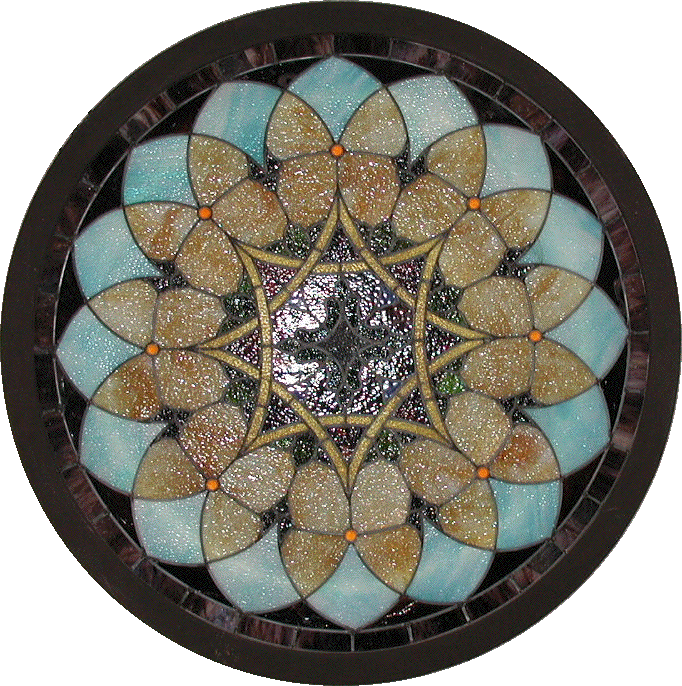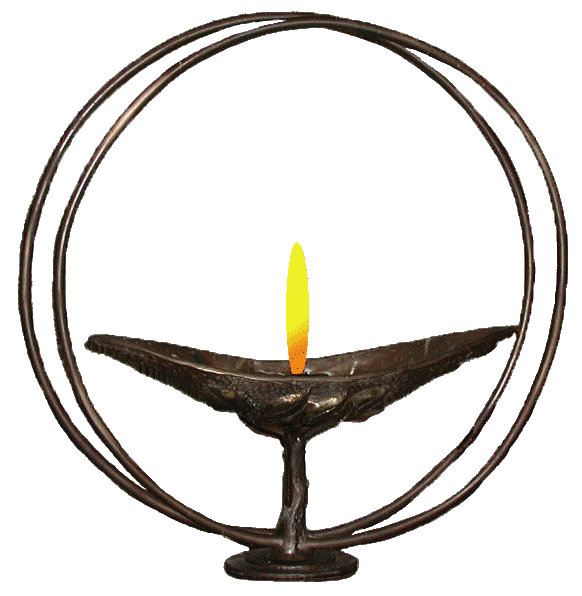 | Unitarian Universalist Church of Bloomington-Normal |
 |
 | Unitarian Universalist Church of Bloomington-Normal |
 |
|
|
LIBERALISM VERSUS COMPETITIVE INDOCTRINATION The story of the founding of this church has been often told – based largely on the account left by Jesse Fell. By 1859 Bloomington had grown to some 8,000, and there were already ten churches in the little community, including, interestingly enough, an African M. E. church which had been established in 1847. Most of the churches of that time were radically evangelistic in nature, and in a young community comprised of newcomers from the East and South it was natural enough to find in the Bloomington of that day and in the interpretation of religious belief a cross section of all the sectional prejudices. The clouds of disunion over the extension of slavery lay heavy on the prairies in the summer of 1859, when a handful of men met in Kersey Fell’s office, “to interchange views” in Jesse Fell’s words, “and to consider whether any measures could be adopted for the establishment of a religious society on broader grounds and of a more progressive character than any existing in the city.” Jesse Fell, of course, was a Quaker from Pennsylvania, and the twenty men who met that day were all of differing creeds. They organized what they called a “Free Congregational Society” to study and practice Christianity. (As Democratic Governor I cannot overlook the fact that those twenty men, my own ancestors included, were all intimate friends of Abraham Lincoln and founders of the Republican Party in Illinois!) A few years later the Society’s name was changed to the Unitarian Church of Bloomington. It is interesting that out here on the prairies of Central Illinois a liberal religious movement sprang up entirely from the grass roots. So far as I can see, no missionary activity from Chicago or the East influenced the organization of this church, which was open to people of all faiths. What’s more, you could get out as easily as you could get in! The concluding sentence of the Declaration of Views prepared in 1861 is amusing and revealing – “There may be objections of this plan, as to every other, but thus far it has worked well, and it has the advantage of having open doors for going out as well as coming in.” Among the most active participants in the early days of the society was Ezra Prince. Thanks to those famous brothers who had so much do with the development of Bloomington – Cyrenius and Elisha Wakefield – the society for some nine years met rent-free in Phoenix Hall. They were also important contributors to the building of this church in 1868. Speaking of the financial fortunes – or rather misfortunes – of the church, I was interested in this item recorded in the account of the 50th anniversary in 1909: “Miss Fannie Fell reported that not a little of the success of the church socials introduced in the early days was due to the excellent waffles made by Mrs. McCann Dunn.” Evidently the waffles warmed the heart of the treasurer while they delighted the palates of the parishioners – and perhaps there is a moral in that for the present treasurer! But to go back: I have heard it said that Unitarians believe in the Fatherhood of God, the brotherhood of man, and the neighborhood of Boston! Be that as it may, Jesse Fell was commissioned by the founders to enlist as the first minister Charles Gordon Ames of Boston, who had been sent out to Minnesota to convert the Indians. Let me hastily add that I find no connection between his mission to the Indians and the Bloomington Unitarians! Evidently the idea of starting out with a brand new liberal religious movement appealed to him, and the famous Dr. Ames came and stayed in Bloomington until he was called back in 1862 to a larger parish in Boston. In a letter written long afterward, Dr. Ames speaks of that first meeting of the new church: “I looked down on the eager faces of a goodly congregation which included some timid sympathizers along with lovers of novelty.” Apparently the “timid sympathizers” and the “novelty seekers” were afraid to join, for we are told that the congregation used to number 150, but the membership was never as large as the congregation. And, sad to relate, what was true so long ago in this remarkable church is true today! Now it is worth noting that the title of Dr. Ames’ first sermon ninety years ago was “The Right and Duty of Independent Thinking in Religion.” The right and duty of independent thinking seems to me to express very aptly the idea of liberalism and individualism, which is the first concern of our generation. Can it be that a chief cause of discord in human affairs is not so much the undesirable nature of beliefs as it is the prevalence of competitive indoctrination among them? Alfred Adler once offered the opinion that “it is easier to fight for one’s beliefs than to live up to them.” In effect this is what we have across the entire fabric of human affairs: rents and tears caused by constant vendetta carried on by competing faiths: religious, economic, social, and ideological. If there is anything that the whole idea of liberalism militates against it is the notion of competitive indoctrination. And therein lies our potential strength in this current era of grace. When we start with the premise that we want human brotherhood to spread and increase until it makes life safe and sane, we must also be certain that there is no one true faith or path by which it may spread. We must forever banish the notion that there can be universal brotherhood just as soon as everyone gives up his faith and accepts ours. That day will never come. The richness of human diversity cannot be abolished. It can be resented and fought, but only at what an appalling cost. Difference is in the nature of life. It is part of our moral universe. It should be gladly and enthusiastically welcomed. There is nothing wrong with the fact of difference. What is wrong are our futile efforts to abolish it. Abolishing diversity is as frustrating a process as abolishing Mars or Jupiter. Let us be sure, then that we as Unitarians understand our proper role. Liberalism is our way of life. From our point of view it is spiritually healthy for us to nurture the attitudes and beliefs which we identify as our own. Let us feel very strongly that we have an important contribution to make, because we have. But let us make doubly sure we do not fall victim to the very practices and attitudes we deplore in more rigid and authoritarian groups. It is not impossible for a slow seepage of doctrinaire backwash to gather around the principles of liberal religion. Liberals are human, subject to the pressures of custom, parenthood and environment. It is perfectly possible for us to hold all our convictions, except tolerance and open-mindedness, in quite doctrinaire fashion. This is not only a philosophical problem but also a very practical one. If a liberal wishes to win friends and influence people (and what liberal doesn’t?), then one thing he cannot afford is the luxury of dogmatism. Of course, our reasonableness cannot be saccharine, but it must be reasonableness, and it must always be motivated by the urge to learn, to share and to find common ground. There is much good, and much sincerity, much altruism in any one of a wide variety of religious and ideological movements in our world. The common hysterical mistake of so many movements is in the feeling that the good is something will be lost unless it is swallowed like a pill, whole and at once, with no questions asked. It is my own feeling that the unbending apparatus we have build about wholesale competitive indoctrination contributes much to discord and strife in human affairs. To convince ourselves and others that there is nothing to fear in difference – that difference, in fact, is one of the healthiest and most invigorating of human characteristics, without which life would become lifeless – is a great task. Here lies the power of the liberal way – not in making the whole world Unitarian, but in helping ourselves and others to see some of the possibilities inherent in viewpoints other than one’s own, in encouraging the free interchanges of ideas, in welcoming fresh approaches to the problems of life in urging the fullest, most vigorous use of critical self-examination. Thus we can learn to grow together, to unite in our common search for the truth beneath a better and happier world. May I conclude, then, in the words of Galations: “Stand fast therefore in the liberty wherewith Christ has made us free, and be not entangled with yoke of bondage.”
|
|
Please direct comments on these pages to webmaster@uubn.org
Unitarian Universalist Church of Bloomington-Normal